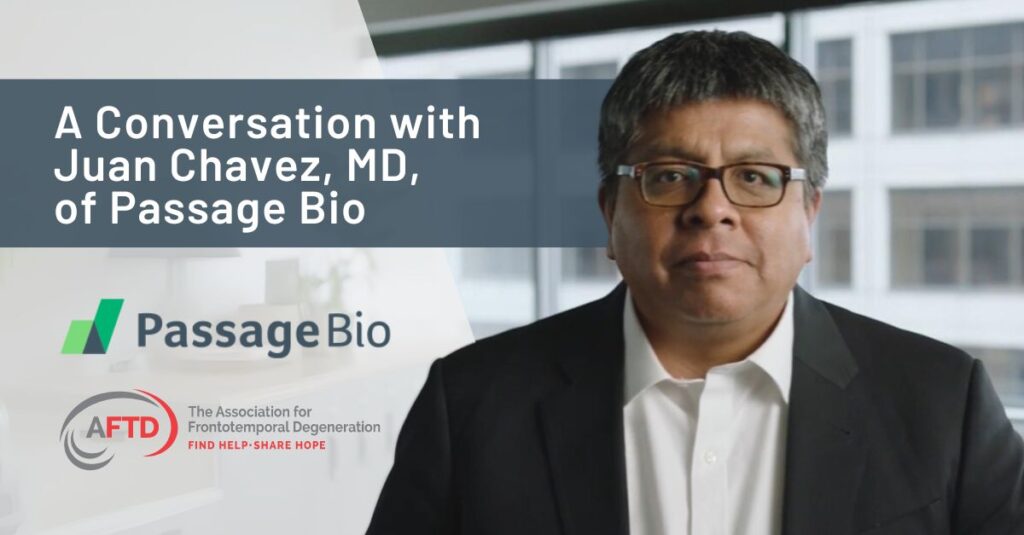A Conversation with Juan Chavez, MD, of Passage Bio

AFTD recently spoke with Passage Bio Vice President of Clinical Development Juan Chavez, MD, about the company’s work to develop a therapy addressing FTD. Here, Dr. Chavez shares where he finds encouragement about today’s research landscape and how the FTD community can come together to further therapeutic development.
What approach is your company using to treat FTD?
Passage Bio is a company engaged in developing gene therapies for people affected by neurodegenerative diseases. In FTD, we are specifically interested in correcting deficient levels of the progranulin protein by providing a functioning granulin gene to people who have a GRN variant. We are using an adeno-associated virus (AAV) gene therapy approach to enable people to produce their own progranulin at sufficient levels that will hopefully prevent cell loss.
AFTD Note: Passage Bio’s upliFT-D study is investigating a gene therapy (PBFT02) that may treat individuals with frontotemporal dementia (FTD) who also have a mutation in the progranulin gene (GRN). The company has also announced plans to expand the clinical trial to include patients with a mutation in the C9orf72 gene. To learn more about the upliFT-D study, or other current clinical trials, please visit AFTD’s Study Seeking Participants page.
What do you think is the most urgent need for persons diagnosed and their families?
FTD is a disease that doesn’t have an effective treatment available. It’s devastating not only to the persons diagnosed, but also to their care partners and family members. This disease affects fundamental functions that define who we are – our behaviors, ability to communicate effectively, and many other functions as well. In general, there is a great need for treatment that will slow the progression of the disease. Ideally, we can either prevent further deterioration, or if we are lucky, we can halt altogether the process.
What are the challenges you see and how can we overcome these together?
I think that general awareness about the disease and availability of accurate information is important so people can be aware of what’s happening and see the possibility of themselves participating in clinical trials. We – the companies – depend on people’s willingness to volunteer for studies. It’s how all of us will make progress in developing treatments.
At Passage Bio, there may be some challenges that are unique to us – each company may have specific challenges depending on what type of treatment is being developed. We have a unique modality to treat FTD, and while we are very excited about our approach because it makes biological sense, we know it’s an approach that requires a lot of expertise.
Bringing together that level of expertise will always be something we need to work on, though I think there is an opportunity there to engage the community – including caregivers, patients, advocacy organizations, researchers, and clinicians – to support what’s required to advance gene therapy treatments like PBFT02.
What role do you hope you and your colleagues play in empowering the FTD community?
It’s always important to ensure there is appropriate and timely information for the people affected. FTD and other neurodegenerative diseases progress quickly, so access to accurate information is necessary.
I think any individual, care partner, or family member affected by this disease should have the option to make decisions as to what potential treatments or interventions could be helpful to them, as well as able to meet their needs and lifestyles. There are several companies developing different options to tackle this disease – with greater awareness about these approaches, people will be able to decide what’s best for them
What is most encouraging about today’s research landscape?
Therapeutic development is a long journey – collectively, it’s about understanding underlying biology and improving the journey to diagnosis. I’m encouraged by the tremendous progress in what we know about the biology of the disease – this is an essential stepping stone for any organization in thinking about how we can develop treatments for diseases like FTD.
These are very complex diseases from a biological perspective. If we are extremely lucky, we can design one therapy that fixes it completely, but in reality, what’s most likely going to happen is that we are going to have to think about potentially combining different treatments to maximize the benefit we hope to achieve.
There are several companies developing potential treatments by leveraging this biology and using very clever methods – they’re all different methods – to administer treatments. I think that’s a cause for celebration because it increases our chances that we could potentially see a treatment for the disease.
AFTD Note: If you’d like to learn more about ongoing clinical trials, please visit our Studies Seeking Participants page or clinicaltrials.gov for more information. Additionally, to learn how you can participate in advancing research, please visit our Ways to Participate page or the FTD Disorders Registry.
By Category
Our Newsletters
Stay Informed
Sign up now and stay on top of the latest with our newsletter, event alerts, and more…
